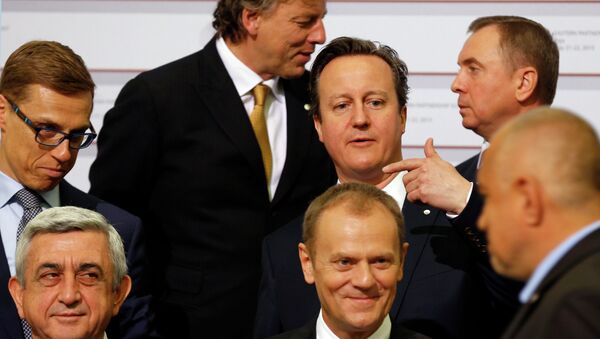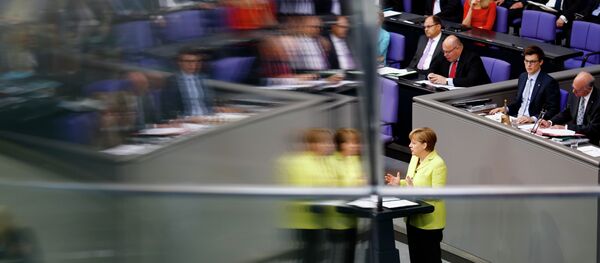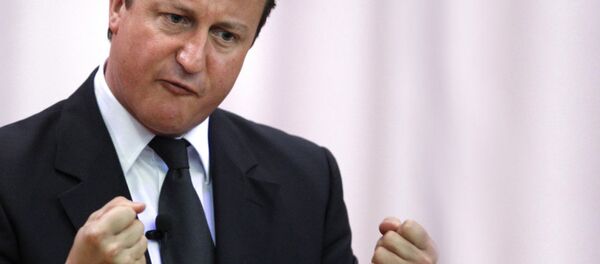Cameron is due to have talks with his EU counterparts on the side-lines of the EU Eastern Partnership Summit in Riga, keen to open up frank negotiations over the UK's membership of the EU.
I'm meeting EU leaders at the #RigaSummit today. I plan to deliver EU reform before holding an in/out referendum by the end of 2017.
— David Cameron (@David_Cameron) May 22, 2015
Having promised his country an In-Out referendum of its membership of the EU, to assuage Eurosceptics within his own party as well as to counter the threat from anti-Europe party UKIP — which won the third largest share of the popular vote in the 2015 general election — Cameron now has to broker a deal with the EU.
His options are limited, however. He changed his tone over the past year, referring to a referendum over a "reformed" EU, rather than a straight In-Out vote. That signaled his personal belief that leaving the EU completely is out of the question, but that winning some sort of reform and return of some powers to London would be enough to silence the Eurosceptics.
Conservative Catastrophe over Europe
Wind back the clock to when John Major was the Conservative leader and Prime Minister in 1997. When he took up office, he vowed to keep Britain "at the very heart of Europe" and negotiated various opt-outs from the Maastricht Treaty, which was an EU instrument designed to further integrate Europe. His Eurosceptics were exceedingly unhappy about the idea of the federalization of Europe and the loss of powers from London to Brussels — despite the few opt-outs Major won.
In the end, the issue of Europe rent the party asunder and the Tories lost the 1997 election and remained out of power for 13 years.
so #RigaSummit #EUSummit UK wants to leave and Ukraine wants to join — is that right? Oh and Greece have no money. Busy day.
— Lily Minster (@lily_minster) May 22, 2015
Having won a slim majority in the 2015 general election, Cameron can at least face his European counterparts having won a mandate for change. However, he must balance his belief in continued EU membership against the need to show his Eurosceptics that he has managed to achieve significant concessions from the Brussels machine.
Nobody more than Germany's Angela Merkel will understand the importance of giving Cameron some sort of lifeline. She — as the leader of the so-called powerhouse of Europe — is struggling to maintain confidence in the euro amid the Greek crisis and sees a 'Brexit' as being hugely damaging to the European dream.
Cameron's Wiggle-Room
Cameron's main issue will be over the fundamental principle of the Treaty enshrined in Article 45 of the Treaty on the Functioning of the European Union — the principle of Free Movement. This allows for all EU nationals to look for a job in another EU country, to work there without needing a work permit and to enjoy equal treatment with nationals in access to employment, working conditions and all other social and tax advantages.
The #RigaSummit has started. Read more about it: http://t.co/GAwOoSxAAn. #EasternPartnership pic.twitter.com/SS4ZtuM4JA
— Donald Tusk (@eucopresident) May 22, 2015
Cameron is unlikely to change the principle of free movement, but he may gain some ground in calling for curbs on "social and tax advantages", which many Eurosceptics claim have led to migrants arriving in the UK and immediately having access to welfare benefits and the National Health Service.
But in curbing some powers of the EU and instigating some reforms in stiff regulation and red tape, Cameron has allies. Finland's Prime Minister Alexander Stubb told reporters on Friday: "Finland is very much in favor of the pro-reform agenda that David Cameron drives. We believe that there are issues that can be discussed with Britain."
Ireland's minister for Europe said:
"Much of what has been suggested and proposed to date by David Cameron would be to the advantage of all of the people of the European Union, particularly in the space of regulation."
Ironically, Cameron's push for more transparency and loosening of red tape mirrors the views of Jean-Claude Juncker, the European Commission president, whose appointment the UK Prime Minister attempted to block. Their differences in the past may yet be the key to a solution to the perennial problem of the UK's membership of the European Union.




